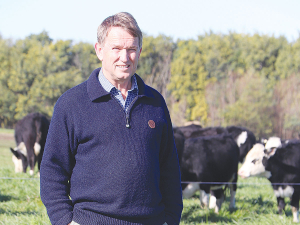Santa's present for the primary sector - an FTA with India
Primary sector leaders have welcomed the announcement of a Free Trade Agreement between India and New Zealand.
 Malcolm Bailey says individual farmers - and the industry itself - have invested massively to minimise the environmental footprint of dairying.
Malcolm Bailey says individual farmers - and the industry itself - have invested massively to minimise the environmental footprint of dairying.
The man who has led the Dairy Companies Association of NZ (DCANZ) for the past 15 years believes the dairy sector does not get enough recognition for what it does for NZ.
Malcolm Bailey, who steps down from his DCANZ role this week, has made a huge contribution to NZ and the dairy sector in particular for nearly four decades.
Bailey says one of the difficult things he's had to overcome in his tenure at DCANZ is getting traction in the media about all the initiatives and works that the industry has done in the face of public criticism.
He says individual farmers - and the industry itself - have invested massively to minimise the environmental footprint of dairying and there have been some real success stories that have not been recognised.
"Yes, people can say nitrate levels on farm are still too high but the pathway of progress has been something to be proud of," Bailey told Rural News.
"It's a bit of a race with no end because you are setting your goals to be even better. I just reflect on the fact that every economic activity has some sort of environmental footprint. In my view, there is a lot of misinformation out there about what is the true state of the industry."
Bailey says people tend to forget that the primary sector is the engine room of the NZ economy and that significant money for health, education and other services comes from the agricultural exports. He says you sometimes read a report about the average NZ water quality which paints a negative picture.
"Well NZ water is actually outstandingly high in world terms," he adds. "Sure, it's not at a level across NZ that we are happy with so that's why we continue to invest in improvement. But remember we are starting from a base that most countries in the world would think was a pretty good place to start."
Meanwhile, Bailey's next gig will have little to do with the dairy industry. Rather he's planning to devote his energies to some of the technology companies he's invested in, which are in the process of producing some outstanding results in agriculture and in industry.
One of the companies Bailey's involved with is Greentech Robotics, based in Palmerston North. It is in the final stages of having one of its products - WeedSpider - operating on farms in the USA. This is set to be the world's first truly autonomous weeding robot, capable of identifying and eliminating weeds in a variety of crops without a human lifting a finger.
Bailey says the idea was developed to help commercial vegetable growers who are facing labour shortages. The robot drives up and down the rows of plants, identifying weeds and removing these. The company also has other products in the pipeline.
"Countries such as the USA, which have strong economic engines, are also at the leading edge in the technology space," Bailey told Rural News. "NZ also has the potential to do this and my economic background is helpful when it comes to crunching numbers and seeing whether a venture is profitable."
Global trade has been thrown into another bout of uncertainty following the overnight ruling by US Supreme Court, striking down President Donald Trump's decision to impose additional tariffs on trading partners.
Controls on the movement of fruit and vegetables in the Auckland suburb of Mt Roskill have been lifted.
Fonterra farmer shareholders and unit holders are in line for another payment in April.
Farmers are being encouraged to take a closer look at the refrigerants running inside their on-farm systems, as international and domestic pressure continues to build on high global warming potential (GWP) 400-series refrigerants.
As expected, Fonterra has lifted its 2025-26 forecast farmgate milk price mid-point to $9.50/kgMS.
Bovonic says a return on investment study has found its automated mastitis detection technology, QuadSense, is delivering financial, labour, and animal-health benefits on New Zealand dairy farms worth an estimated $29,547 per season.

OPINION: Here w go: the election date is set for November 7 and the politicians are out of the gate…
OPINION: ECan data was released a few days ago showing Canterbury farmers have made “giant strides on environmental performance”.